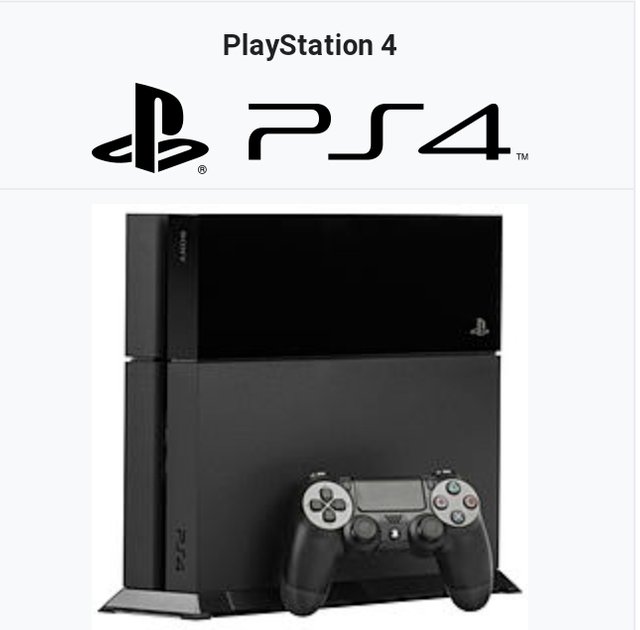PlayStation 4
The PlayStation 4 (PS4) is a home video game console developed by Sony Computer Entertainment. Announced as the successor to the PlayStation 3 in February 2013, it was launched on November 15, 2013, in North America, November 29, 2013 in Europe, South America and Australia, and on February 22, 2014 in Japan. A console of the eighth generation, it competes with Microsoft's Xbox One and Nintendo's Wii U and Switch.

The original PlayStation 4 console with a
DualShock 4 controller
Also known as
PS4
Developer
Sony Computer Entertainment
Manufacturer
Sony Electronics, Foxconn
Product family
PlayStation
Type
Home video game console
Generation
Eighth generation
Release date
NA: November 15, 2013[2]
PAL: November 29, 2013[2]
JP: February 22, 2014[3]
Lifespan
2013–present
Introductory price
US$399.99, €399.99, £349.99
Discontinued
JP: January 5, 2021 (all models except PS4 Slim)
Units sold
106 million (as of December 31, 2019)[4]
Units shipped
116.9 million (as of December 31, 2021)[5]
Media
Blu-ray
DVD
Digital distribution
Operating system
PlayStation 4 system software
CPU
Semi-custom 8-core AMD x86-64 Jaguar 1.6 GHz CPU (2.13 GHz on PS4 Pro) (integrated into APU)
Secondary low power processor (for background tasks)[7]
Memory
All models: 8 GB GDDR5 RAM
PS4 & Slim: 256 MB DDR3 RAM (for background tasks)
Pro: 1 GB DDR3 RAM (for background tasks)
Storage
Capacities: 500 GB, 1 TB, 2 TB
Types: HDD; SSD (user installable)
User upgradable: Yes
Display
PS4 & Slim: 480p, 720p, 1080i, 1080p via HDMI 2.0a
Pro: 4K UHD via HDMI 2.0b
Graphics
Custom AMD GCN Radeon integrated into APU; clocked at 800 MHz (911 MHz on PS4 Pro)
Controller input
DualShock 4, PlayStation Move, PlayStation Vita
Camera
PlayStation Camera
Connectivity
All models: HDMI, Gigabit Ethernet
PS4: Wi-Fi IEEE 802.11n, Bluetooth 2.1, USB 3.0
Slim & Pro: Wi-Fi IEEE 802.11ac, Bluetooth 4.0, USB 3.1
Power
Via internal wide voltage range (110–240 V AC 50 Hz/60 Hz) switched-mode power supply
Online services
PlayStation Network
PlayStation Now
Dimensions
PS4: 2.09 in × 12 in × 10.8 in (53 mm × 305 mm × 274 mm)
Slim: 1.54 in × 11.3 in × 10.4 in (39 mm × 287 mm × 264 mm)
Pro: 2.17 in × 12.9 in × 11.6 in (55 mm × 328 mm × 295 mm)
Mass
PS4 (1st generation): 2.8 kg (6.2 lbs)
PS4 (2nd generation): 2.5 kg (5.5 lbs)
Slim: 2.1 kg (4.6 lbs)
Pro: 3.3 kg (7.3 lbs)
Predecessor
PlayStation 3
Successor
PlayStation 5
Website
playstation.com/ps4/
Moving away from the more complex Cell microarchitecture of its predecessor, the console features an AMD Accelerated Processing Unit (APU) built upon the x86-64 architecture, which can theoretically peak at 1.84 teraflops; AMD stated that it was the "most powerful" APU it had developed to date. The PlayStation 4 places an increased emphasis on social interaction and integration with other devices and services, including the ability to play games off-console on PlayStation Vita and other supported devices ("Remote Play"), the ability to stream gameplay online or to friends, with them controlling gameplay remotely ("Share Play"). The console's controller was also redesigned and improved over the PlayStation 3, with improved buttons and analog sticks, and an integrated touchpad among other changes. The console also supports HDR10 High-dynamic-range video and playback of 4K resolution multimedia.
The PlayStation 4 was released to critical acclaim, with critics praising Sony for acknowledging its consumers' needs, embracing independent game development, and for not imposing the restrictive digital rights management schemes like those originally announced by Microsoft for the Xbox One. Critics and third-party studios, before its launch, also praised the capabilities of the PlayStation 4 in comparison to its competitors; developers described the performance difference between the console and Xbox One as "significant" and "obvious". Heightened demand also helped Sony top global console sales. By October 2019, PS4 became the second-best-selling home game console of all time, behind the PlayStation 2.
On September 7, 2016, Sony unveiled the PlayStation 4 Slim, a smaller version of the console; and a high-end version called the PlayStation 4 Pro, which features an upgraded GPU and a higher CPU clock rate to support enhanced performance and 4K resolution in supported games.
Its successor, the PlayStation 5, was released in November 2020, with Sony discontinuing in Japan all PlayStation 4 models except the Slim version in January 2021, with it still being produced in Western markets following their statement of 3-year support of PS4.
suppar
nice
Excellent
Excellent